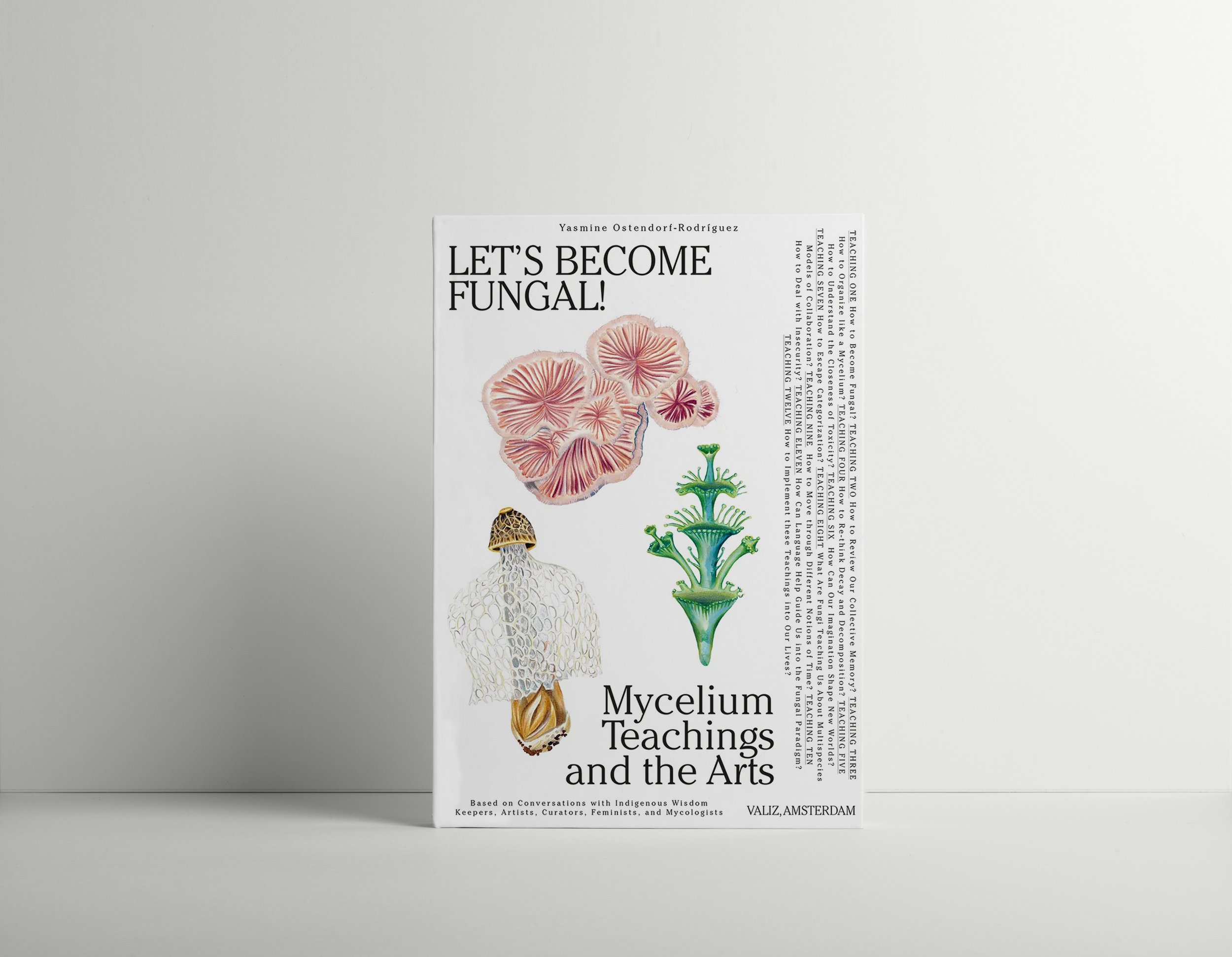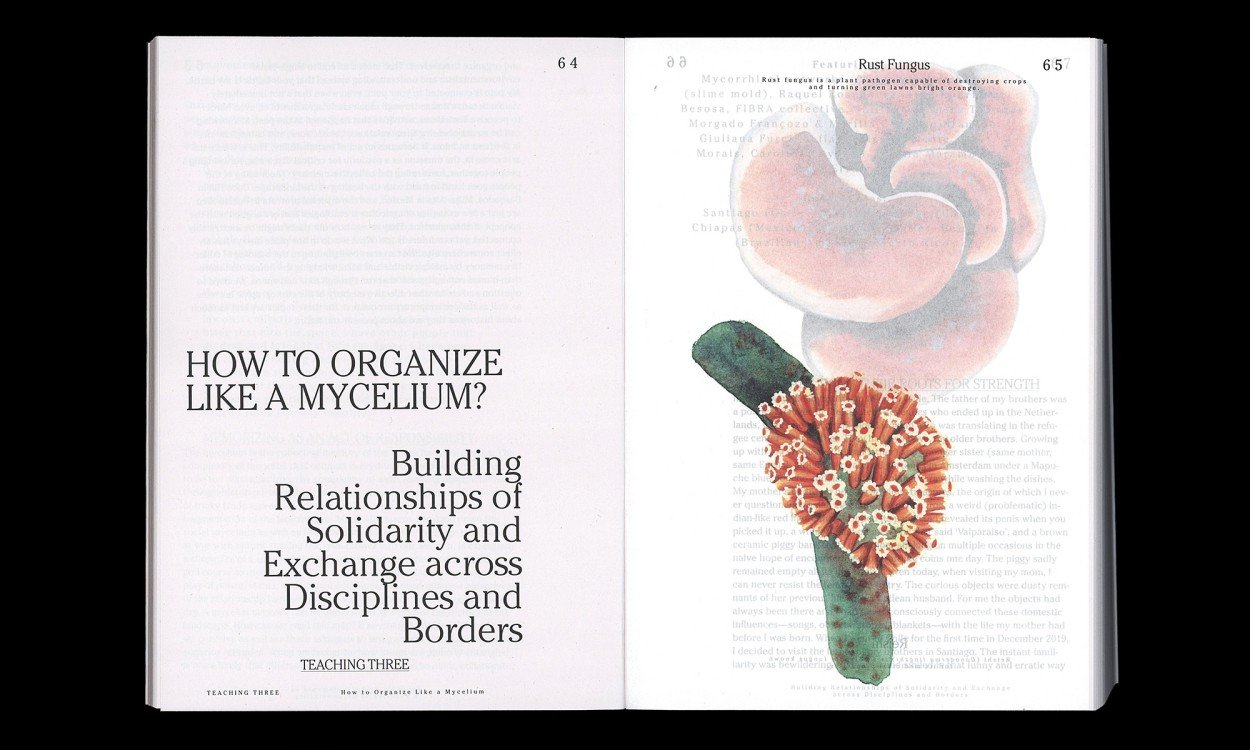





Let’s Become Fungal! Mycelium Teachings and the Arts
Draws on art and uses the world of mycology and the mycelium of the fungal world as source of inspiration
Based on conversations with indigenous artists, curators, feminists and mycologists
Explores collaborative practices rooted in interspecies exchange, symbiosis, alliances, non-monetary mediation, decentralization, bottom-up methods and equal dependence
Proposes new ways of thinking that can be activated in powerful networks, networks and organizations
There is a growing interest in fungi and mycelium as a material, the ever-branching connecting threads of the fungal world. The entanglements and how this rhizomatic network functions is not just a fascinating ecological system and material, but carries a profound usefulness as a metaphor for our potential new systems, ways of thinking and behaviors.
Let’s Become Fungal! takes its inspiration from the world of art and mycology and shares innovative practices from Latin America and the Caribbean that are rooted in multispecies collaboration, symbiosis, alliances, non-monetary resource exchange, decentralization, bottom-up methods and mutual dependency—all in line with the behavior of the mycelium.
Every chapter is phrased as a question. They do not lead to answers, but to twelve teachings addressing for instance collaboration, decoloniality, non-linearity, toxicity, mobilization, biomimicry, death, and being non-binary. Simultaneously it ventures deeper into the world of fungi. The teachings from the fungus may inspire artists, collectives, organizations, educators, policy-makers, designers, scientists, anthropologists, change-makers, curators, urbanists, activists, gardeners, community-leaders, farmers, and many others, to become more fungal in their ways of working and being.
Let’s Become Fungal! Workshops
Let’s Become Fungal! is more than a book. It’s a methodology and a way of thinking that can be activated in communities, networks, and organizations. The author offers a program of twelve collaboratively crafted mycelial workshops to activate each Teaching with a group. From mycelial meditations to Reading Groups to biomimicry exercises, the workshops are suitable for anyone who, after reading this book, wants to become fungal. In addition to the author, the workshops are guided by guest mycologists, (bio)designers, architects, artists, and community organizers. Workshops last one full day and groups can be between ten to thirty people.
Author: Yasmine Ostendorf-Rodríguez
Pages 336
24 x 17 cm (h x w)
Softcover
Language English
Let’s Become Fungal! Mycelium Teachings and the Arts
Draws on art and uses the world of mycology and the mycelium of the fungal world as source of inspiration
Based on conversations with indigenous artists, curators, feminists and mycologists
Explores collaborative practices rooted in interspecies exchange, symbiosis, alliances, non-monetary mediation, decentralization, bottom-up methods and equal dependence
Proposes new ways of thinking that can be activated in powerful networks, networks and organizations
There is a growing interest in fungi and mycelium as a material, the ever-branching connecting threads of the fungal world. The entanglements and how this rhizomatic network functions is not just a fascinating ecological system and material, but carries a profound usefulness as a metaphor for our potential new systems, ways of thinking and behaviors.
Let’s Become Fungal! takes its inspiration from the world of art and mycology and shares innovative practices from Latin America and the Caribbean that are rooted in multispecies collaboration, symbiosis, alliances, non-monetary resource exchange, decentralization, bottom-up methods and mutual dependency—all in line with the behavior of the mycelium.
Every chapter is phrased as a question. They do not lead to answers, but to twelve teachings addressing for instance collaboration, decoloniality, non-linearity, toxicity, mobilization, biomimicry, death, and being non-binary. Simultaneously it ventures deeper into the world of fungi. The teachings from the fungus may inspire artists, collectives, organizations, educators, policy-makers, designers, scientists, anthropologists, change-makers, curators, urbanists, activists, gardeners, community-leaders, farmers, and many others, to become more fungal in their ways of working and being.
Let’s Become Fungal! Workshops
Let’s Become Fungal! is more than a book. It’s a methodology and a way of thinking that can be activated in communities, networks, and organizations. The author offers a program of twelve collaboratively crafted mycelial workshops to activate each Teaching with a group. From mycelial meditations to Reading Groups to biomimicry exercises, the workshops are suitable for anyone who, after reading this book, wants to become fungal. In addition to the author, the workshops are guided by guest mycologists, (bio)designers, architects, artists, and community organizers. Workshops last one full day and groups can be between ten to thirty people.
Author: Yasmine Ostendorf-Rodríguez
Pages 336
24 x 17 cm (h x w)
Softcover
Language English
